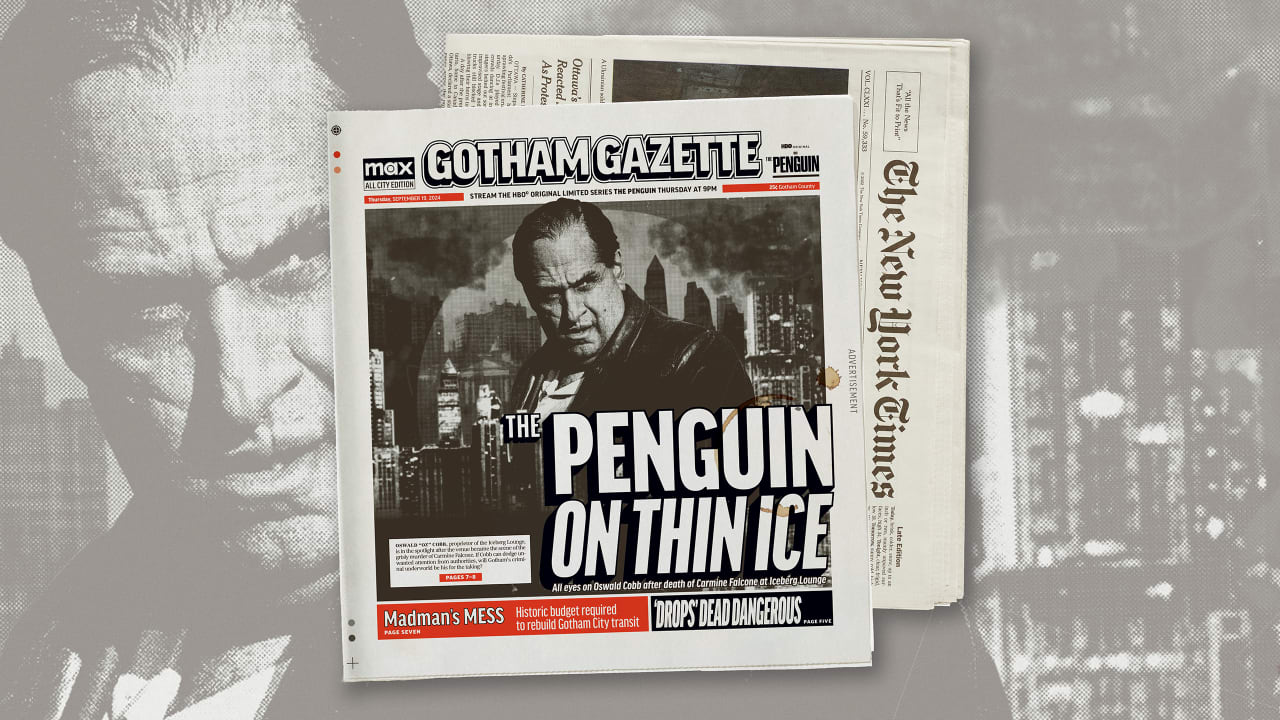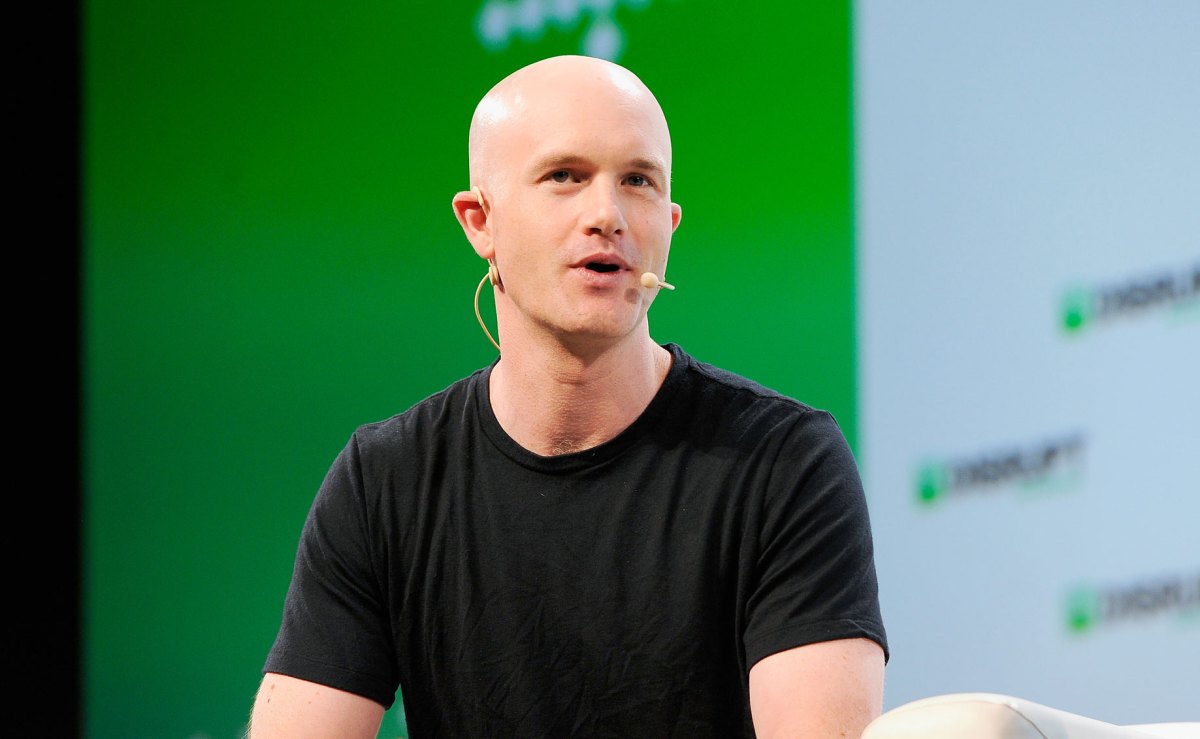Here’s how the ‘New York Times’ became the ‘Gotham Gazette’ for a single day
Given the semi-annual world-ending events and the bevy of unhinged, heavily costumed folks behind them, a comic book universe would be an objectively terrible place to live. Luckily, New York City is not Gotham City—even though it inspired it. But if you pass through Grand Central Station today, or Little Italy, or Times Square, you’ll see old-school newspaper hawkers schlepping copies of the Gotham Gazette—and if you’re a print subscriber of The New York Times, you’ll even get one right on your doorstep, wrapped around your regular paper. I wouldn’t want to live in the DC universe. But as it turns out, it’s a pretty delightful place to visit for a few minutes, thanks to the streaming service Max and T Brand Studio’s newspaper collaboration for the new series The Penguin, which is set in Matt Reeves’ Batman timeline and debuts today. “This opportunity was one that really felt natural for us, because there’s honestly nothing more New York [and thus Gotham City] than The New York Times,” says Vida Cornelious, senior vice president of creative at T Brand, the Times’ advertising content studio. “The Gazette has been the daily paper of the Batman universe since the 1940s, and what better way to complement the show than by bringing it to life and delivering it all over the country?” [Photo: Max] EASTER EGGS AND RIDDLER ESCAPE ROOMS Cornelious says Max approached her team a few months back with an RFP tied to The Penguin, which places the titular secondary character from Reeves’ first film, The Batman, in a crime saga all his own. T Brand responded with the idea of writing, designing, printing, and wrapping DC’s tabloid of record—which debuted in Batman #4 in December, 1940—around the official U.S. paper of record. “Our goal was really to try and build a believable world with the types of everyday melodrama you might find in any daily tabloid,” Cornelious says. To that end, in The Gazette there’s an article on conditions and issues within the prison housing the Riddler, the primary villain of The Penguin. There’s an op-ed bemoaning mold problems that are the result of the Riddler flooding Gotham in the first film. And my personal favorite: A piece headlined, “Riddler-Inspired Escape Room Raises Eyebrows.” (Cornelious says the T Brand edit team had a ball pitching stories for the fictional paper.) Collectively, it’s all the minutiae of the real news cycle that would fill the void between the explosive events of tentpole comic book storylines, and it’s fascinating in its small-scale world building. There are, of course, also hints at big elements of the new show, such as an article about an heir to the Falcone crime family, an editorial cartoon detailing a missing Batman, and more. The cover, meanwhile, sets the stage for the series with its unabashed, all-out tabloid headline treatment: “The Penguin on Thin Ice.” And if the design looks familiar, that’s on purpose. The team drew influence from the Gotham Gazette props in The Batman and The Penguin, which paid obvious homage to New York’s real-world counterparts via screaming type and wordplay and design. “It was most important that we were replicating that world of DC’s Gotham really accurately, from the colors to the fonts to the photography to the illustration and, of course, the writing style,” Cornelious says. “It really did come down to the details.” If you came for the easter eggs, they’re here, too. You could start by Googling the bylines of some of those fictive journalists within for some fun callbacks, and you “may also notice what seems to be a secondary character from The Penguin looking for love in the classified ads …” [Photo: Max] MARKETING MISFIRES In an era where “fake news” is more often than not real, and the world is dominated by false narratives and AI imagery, the paper is clearly stamped as an advertisement, lest anyone think the Penguin is indeed taking over Gotham. Moreover, Cornelious adds that the Times’ ad standards and legal teams review T Brand’s output, which is the key to her department living up to the institution’s rigorous standards is authenticity—in this case, she says, to the spirit and ethos of the world Reeves built. While T Brand didn’t have access to the episodes for reference, Cornelious’ team had briefs outlining elements of the storytelling. Pia Chaozon Barlow, EVP of Originals Marketing at Max and HBO, wrote to Fast Company that showrunner Lauren LeFranc also worked closely with the team on the project, which had a strategic and practical angle to it, too. “Partnering with The New York Times to produce the Gazette made perfect sense—it’s the most iconic New York City news outlet, and it allows us to reach not just superhero fans, but also those who love broader prestige crime dramas,” she detailed. [Photo: Max] Beyond the print piece, a full digital campaign is rolling out on the websites of The New York Times and its sports hub The Athletic, featuring a countdow

Given the semi-annual world-ending events and the bevy of unhinged, heavily costumed folks behind them, a comic book universe would be an objectively terrible place to live. Luckily, New York City is not Gotham City—even though it inspired it. But if you pass through Grand Central Station today, or Little Italy, or Times Square, you’ll see old-school newspaper hawkers schlepping copies of the Gotham Gazette—and if you’re a print subscriber of The New York Times, you’ll even get one right on your doorstep, wrapped around your regular paper.
I wouldn’t want to live in the DC universe. But as it turns out, it’s a pretty delightful place to visit for a few minutes, thanks to the streaming service Max and T Brand Studio’s newspaper collaboration for the new series The Penguin, which is set in Matt Reeves’ Batman timeline and debuts today.
“This opportunity was one that really felt natural for us, because there’s honestly nothing more New York [and thus Gotham City] than The New York Times,” says Vida Cornelious, senior vice president of creative at T Brand, the Times’ advertising content studio. “The Gazette has been the daily paper of the Batman universe since the 1940s, and what better way to complement the show than by bringing it to life and delivering it all over the country?”

EASTER EGGS AND RIDDLER ESCAPE ROOMS
Cornelious says Max approached her team a few months back with an RFP tied to The Penguin, which places the titular secondary character from Reeves’ first film, The Batman, in a crime saga all his own. T Brand responded with the idea of writing, designing, printing, and wrapping DC’s tabloid of record—which debuted in Batman #4 in December, 1940—around the official U.S. paper of record.
“Our goal was really to try and build a believable world with the types of everyday melodrama you might find in any daily tabloid,” Cornelious says.
To that end, in The Gazette there’s an article on conditions and issues within the prison housing the Riddler, the primary villain of The Penguin. There’s an op-ed bemoaning mold problems that are the result of the Riddler flooding Gotham in the first film. And my personal favorite: A piece headlined, “Riddler-Inspired Escape Room Raises Eyebrows.” (Cornelious says the T Brand edit team had a ball pitching stories for the fictional paper.)
Collectively, it’s all the minutiae of the real news cycle that would fill the void between the explosive events of tentpole comic book storylines, and it’s fascinating in its small-scale world building. There are, of course, also hints at big elements of the new show, such as an article about an heir to the Falcone crime family, an editorial cartoon detailing a missing Batman, and more.
The cover, meanwhile, sets the stage for the series with its unabashed, all-out tabloid headline treatment: “The Penguin on Thin Ice.” And if the design looks familiar, that’s on purpose. The team drew influence from the Gotham Gazette props in The Batman and The Penguin, which paid obvious homage to New York’s real-world counterparts via screaming type and wordplay and design.
“It was most important that we were replicating that world of DC’s Gotham really accurately, from the colors to the fonts to the photography to the illustration and, of course, the writing style,” Cornelious says. “It really did come down to the details.”
If you came for the easter eggs, they’re here, too. You could start by Googling the bylines of some of those fictive journalists within for some fun callbacks, and you “may also notice what seems to be a secondary character from The Penguin looking for love in the classified ads …”

MARKETING MISFIRES
In an era where “fake news” is more often than not real, and the world is dominated by false narratives and AI imagery, the paper is clearly stamped as an advertisement, lest anyone think the Penguin is indeed taking over Gotham. Moreover, Cornelious adds that the Times’ ad standards and legal teams review T Brand’s output, which is the key to her department living up to the institution’s rigorous standards is authenticity—in this case, she says, to the spirit and ethos of the world Reeves built.
While T Brand didn’t have access to the episodes for reference, Cornelious’ team had briefs outlining elements of the storytelling. Pia Chaozon Barlow, EVP of Originals Marketing at Max and HBO, wrote to Fast Company that showrunner Lauren LeFranc also worked closely with the team on the project, which had a strategic and practical angle to it, too.
“Partnering with The New York Times to produce the Gazette made perfect sense—it’s the most iconic New York City news outlet, and it allows us to reach not just superhero fans, but also those who love broader prestige crime dramas,” she detailed.

Beyond the print piece, a full digital campaign is rolling out on the websites of The New York Times and its sports hub The Athletic, featuring a countdown to Gotham’s mayoral “State of the City,” which coincides with The Penguin’s premiere, as well as headlines from Gotham City One news. And out on the streets, those aforementioned paper hawkers will be handing out standalone copies of the Gotham Gazette, which is likely to become a collector’s item to Bat fans.
Ultimately, viral marketing campaigns in the entertainment world can be a mixed bag. There’s the time The Blair Witch Project framed its (woefully compensated) stars as missing or dead. Or, the time Mission Impossible: III rigged newspaper boxes with devices that were supposed to play the movie’s theme song, but instead were mistaken for bombs. Or, more recently, the Megalopolis trailer intended to be subversive that ended up being stocked with AI-generated fake quotes attributed to real movie critics.
Which is all to say: It’s easy to take a big swing and go wrong. And it’s surprising when it just feels organically right and is, indeed, fit to print.






















